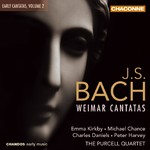
Early Cantatas, volume 2 (Weimar)
 $28.00
Out of Stock
$28.00
Out of Stock2-6 weeks add to cart
J.S. BACH
Early Cantatas, volume 2 (Weimar)
Emma Kirkby (soprano) / Michael Chance (counter-tenor) / Charles Daniels (tenor) / Peter Harvey (bass) / The Purcell Quartet
[ Chandos / CD ]
Release Date: Friday 1 June 2007
This item is currently out of stock. We expect to be able to supply it to you within 2 - 6 weeks from when you place your order.
"This undirected group of soloists and instrumentalists works together with impressive cohesiveness. Without the sense - which in other kinds of performance one can never quite escape, for good or ill - of the personality and interpretative of a 'dominant' conductor, these performances achieve a real air of being what one might reasonably think of as 'spiritual conversations'." (MusicWeb July 2007)
"This undirected group of soloists and instrumentalists works together with impressive cohesiveness. Without the sense - which in other kinds of performance one can never quite escape, for good or ill - of the personality and interpretative of a 'dominant' conductor, these performances achieve a real air of being what one might reasonably think of as 'spiritual conversations'. One has a sense of views and experiences shared and exchanged and, out of that interchange, of the emergence of a kind of consensus, a shared affirmation of faith expressed in the closing chorales. Larger scale performances of the cantatas can make one reach for theatrical metaphors; here, as I have suggested, one thinks more readily of a kind of heightened conversation."
(MusicWeb July 2007)
The Purcell Quartet has released over thirty discs on Chandos, and has received the highest commendations in the press.
This is a unique collection of cantatas from the time of Bach's service at the court of Weimar.
The Weimar cantatas belong to a period in Bach's life when he had taken the title of 'Concertmaster' at the Weimar court. The principal condition of his new post was an obligation to produce a new church cantata on a monthly basis, a task to which Bach applied himself with great zeal. Previously, he had composed vocal music infrequently and only as particular occasions demanded. He now faced the task of writing cantatas at regular intervals for Sundays and feast days of the liturgical year. There arose a series of some thirty cantatas, with free verse texts as the essential basis for the composition of recitatives and da capo arias, entirely lacking from Bach's earliest cantatas. Of great significance for Bach was his encounter with the modern Italian style, to which the Weimar court orchestra began to adapt itself. From then on a thoroughly worked-out setting for the outer voices, with concise and unified thematic material and a clearly articulated plan of modulation, typical of Vivaldi, remained an essential element in Bach's style of composition. This technique was coupled with complex counterpoint, a distinct and lively texture of middle voices, and harmonic finesse, the whole elevated to a highly characteristic level.
Uniquely, The Purcell Quartet employs single voices - no choir - which is in keeping with evidence of what Bach himself used. The stance is still controversial, but recreates the works as they would have been performed originally, and therefore stands out from the more conventional approach, the product of subsequent developments of massed choral singing. Accompanied by The Purcell Quartet and their guest instrumentalists, the voices, their lines and hence also the meaning of the texts, are allowed to stand out and make their full effect. Included on this disc are BWV 61 Nun komm, der Heiden Heiland, deservedly one of the most popular of Bach's cantatas, and one of Bach's most tranquil and beautifully expressive works, and BWV 161 Komm, du süße Todesstunde, and they benefit greatly from performances by one of today's most popular early music groups.
The Weimar cantatas of J.S. Bach form an exceptional body of work and it is thrilling to hear them performed in a way that Bach would have recognised.
Tracks:
Weinen, Klagen, Sorgen, Zagen, BWV 12
Gleichwie der Regen und Schnee vom Himmel fällt, BWV 18
Nun komm, der Heiden Heiland, BWV 61
Komm, du süße Todesstunde, BWV 161



